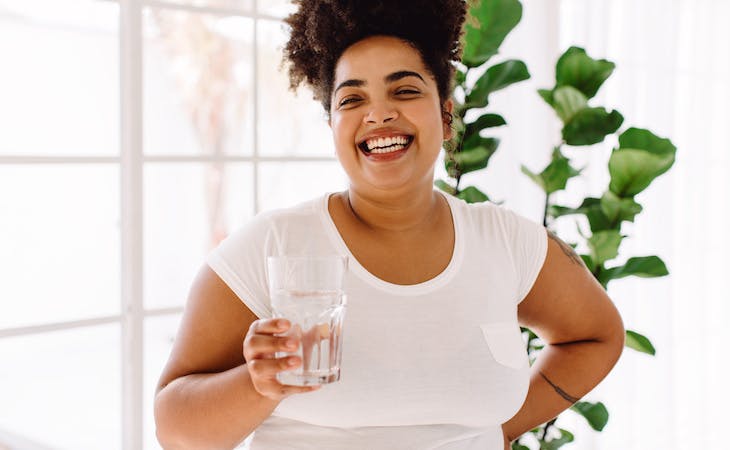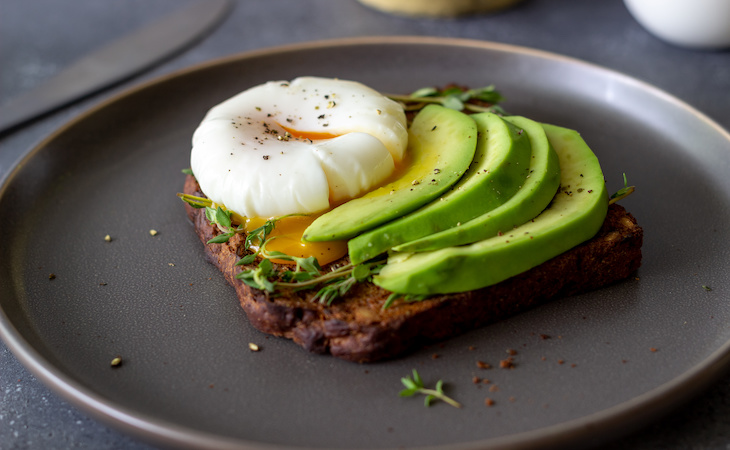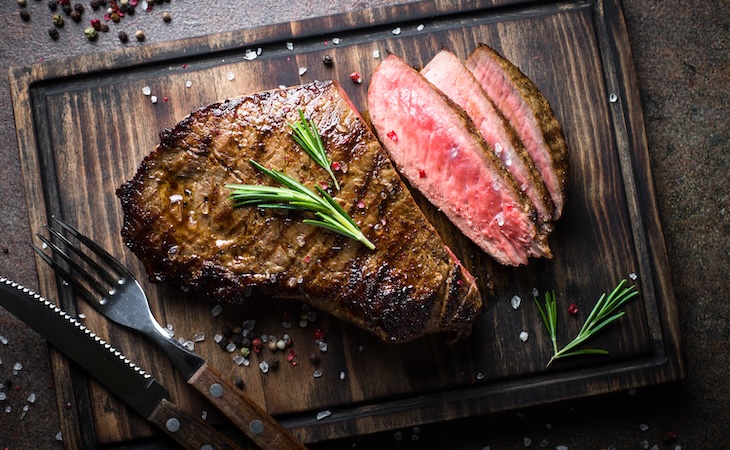We all know that drinking water is important. After all, our bodies are made up of up to 75% water. [2] However, sometimes it can be difficult to stay hydrated during the day as we go about our busy lives.
But did you know dehydration can actually begin to disrupt your quality of sleep? It’s true! Dehydration can lead to things like sleep deprivation, leg cramps, high blood pressure, and more. [3, 4, 5]
Below, we’re sharing our top tips to help you stay hydrated so you can get a better night’s sleep. Keep reading to learn about the benefits of drinking a glass of water before bed and staying hydrated all night long so you can start improving your sleep habits today.
How staying hydrated all day can positively affect your quality of sleep
When you’re getting ready for bed, the last thing you want to do is be discomforted by dehydration. If you stay properly hydrated throughout the day, here are some top benefits that can help improve your quality of sleep:
- Regulate your body temperature: If have trouble falling asleep because you’re too hot or too cold, drinking water may be able to help you fall asleep faster. If you sleep hot, drinking cold water before bed may help lower your body temperature. On the flip side, drinking warm water or hot water may help keep you warmer throughout the night if you sleep cold. [6]
- Prevent nocturia and other symptoms: Nocturia is the term for frequently urinating in the middle of the night. [7] Whether you have an overactive bladder or drink a lot of water before bed, this can disrupt your sleep duration. [5, 7] Consistently drinking water throughout the day (rather than guzzling a ton of water at night) may help prevent nocturia, bladder infections, and overactive bladder symptoms. [7]
- Mental health improvements: Better quality sleep may also assist in improving your mental health. [8] By staying hydrated, you may find you have more energy in the morning and aren’t as prone to sleepiness throughout the day. [9]
Side effects and health issues associated with sleep and dehydration
You might be wondering how, exactly, water plays a role in how well you sleep. It’s simple: When you’re not drinking enough water, you can become dehydrated.
Here are just some of the ways being dehydrated can interfere with a good night’s sleep:
- Nighttime leg cramps: Dehydration increases your risk of leg cramps. The risk is especially high if you exercise a lot or live somewhere very hot. That’s because the more you sweat, the more fluids and electrolytes you lose—and that can cause your muscles to cramp up. [3]
- Snoring: If you’re not drinking the correct amount of water throughout the day, your nasal passages can get pretty dry. [10] This can cause mucous in your nose and upper airway to become thicker than normal, which can impair airflow and lead to snoring. [11] (If you or your partner has a serious snoring issue, check in with your doctor to make sure you don’t have sleep apnea, a potentially dangerous sleep disorder and health condition. [21] Here’s how to sleep better with sleep apnea.)
- High blood pressure: Sometimes dehydration can cause you to have high blood pressure. That’s because your blood vessels have to work harder to pump out blood when you’re dehydrated—and that can cause trouble falling asleep. Consistently staying hydrated can also help prevent heart disease and irregular blood sugar levels because your heart won’t have to work as hard to get blood to other parts of the body. [12]
- Excessive thirst: You may wake up thirsty in the middle of the night if you don’t drink enough water during the day. [16] This can lead to a lack of sleep and interrupt your sleep-wake cycle if it happens regularly.
- Brain fog: When you don’t down enough H2O, expect to feel sluggish the next day. Tracking your fluid intake throughout the day can help you improve your alertness and energy levels the next day. [1, 13, 15]
Signs you may not be drinking enough water
Potential sleep problems aside, pay attention to these other signals you may need to up your water intake. The human body needs a lot of water throughout the day to support your immune system and help you get enough sleep.
You may not be drinking enough water if you have:
- Dark urine or low urine production: This is a telltale sign of dehydration. This is how your body tells you it’s time to replenish your water supply. [1]
- Dry skin: Even if you use moisturizer, your skin may remain dry if you’re not properly hydrated. You may also experience a dry mouth throughout the day if you’re dehydrated. [1]
- Trouble focusing: Dehydration has a negative impact on the blood supply to your brain. Since water helps to improve blood circulation, you may become foggy-headed and unable to concentrate for long periods of time if you’re dehydrated. [15]
- Headaches: These are also linked to blood supply issues and can be caused by dehydration. [16]
- Fatigue: Dehydration makes the heart work harder to pump blood out to muscles, which can lead to fatigue and sleep deprivation. [1,14] (Take our quiz to learn how sleep-deprived you really are.)
How to drink enough water (without waking up to pee)
It’s commonly said that the human body needs eight glasses of water a day. But your exact fluid intake will vary based on individual factors like your body size, activity level, and more. [16, 17]
The best way to tell if you’re drinking enough water throughout the day is to look at the color of your urine. If you’re properly hydrated, then your pee should be a very light yellow color—almost clear. [19]
Here are more tips to help you increase your water intake during the day so you’re properly hydrated. (Just keep in mind that though it’s best to consistently sip water throughout the day, drinking too much water late at night can lead to middle-of-the-night bathroom trips—and those can hinder your sleep just as much as dehydration.)
- Stick to drinking water that’s filtered: Some cities across the United States have water with unsafe lead levels. [20] In order to truly reap the health benefits of staying hydrated, you should try to drink filtered water as frequently as possible. [20] Try a filtered water pitcher for your refrigerator. Brita makes great ones!
- Use your water bottle to keep track of how much you’re drinking: If you’re a visual person, you may benefit from investing in a water bottle with lines to tell you how much you need to drink by a certain time of day.
- Set reminders: Your phone can help you remember to continue drinking water throughout the day. We like to use water-tracking apps that have a calculator to help you figure out how much H2O you need daily. They also allow you to set up push notifications to nudge you to refill your water bottle.
And while we’re on the topic of drinking, here’s how alcohol messes with your sleep.
FAQs
Does lack of water affect sleep?
A lack of water will lead to dehydration, causing dry nasal passages and snoring, high blood pressure, excessive thirst, and nighttime leg cramps. All of these things can affect the quality of your sleep and how fast you fall asleep. [1, 3, 10, 12, 16]
When should you drink water to maximize sleep?
Rather than drinking a ton of water at night, try consistently drinking water throughout the day to help prevent nocturia, bladder infections, and overactive bladder symptoms and to maximize sleep. [7]
References
- Medline Plus. Dehydration. https://medlineplus.gov/dehydration.html
- Riebl SK, Davy BM. The Hydration Equation: Update on Water Balance and Cognitive Performance. ACSMs Health Fit J. 2013;17(6):21-28. doi:10.1249/FIT.0b013e3182a9570f
- Hallegraeff J, de Greef M, Krijnen W, van der Schans C. Criteria in diagnosing nocturnal leg cramps: a systematic review. BMC Fam Pract. 2017;18(1):29. Published 2017 Feb 28. doi:10.1186/s12875-017-0600-x
- Watso JC, Farquhar WB. Hydration Status and Cardiovascular Function. Nutrients. 2019;11(8):1866. Published 2019 Aug 11. doi:10.3390/nu11081866
- Rosinger AY, Chang AM, Buxton OM, Li J, Wu S, Gao X. Short sleep duration is associated with inadequate hydration: cross-cultural evidence from US and Chinese adults. Sleep. 2019;42(2):10.1093/sleep/zsy210. doi:10.1093/sleep/zsy210
- CDC. Water and Healthier Drinks. https://www.cdc.gov/healthyweight/healthy_eating/water-and-healthier-drinks.html
- NIH. Nocturia. https://www.ncbi.nlm.nih.gov/books/NBK518987/
- Scott AJ, Webb TL, Martyn-St James M, Rowse G, Weich S. Improving sleep quality leads to better mental health: A meta-analysis of randomised controlled trials. Sleep Med Rev. 2021;60:101556. doi:10.1016/j.smrv.2021.101556
- Riebl SK, Davy BM. The Hydration Equation: Update on Water Balance and Cognitive Performance. ACSMs Health Fit J. 2013;17(6):21-28. doi:10.1249/FIT.0b013e3182a9570f
- Asim M, Alkadi MM, Asim H, Ghaffar A. Dehydration and volume depletion: How to handle the misconceptions. World J Nephrol. 2019;8(1):23-32. doi:10.5527/wjn.v8.i1.23
- Magliulo G, Iannella G, Ciofalo A, et al. Nasal pathologies in patients with obstructive sleep apnoea. Acta Otorhinolaryngol Ital. 2019;39(4):250-256. doi:10.14639/0392-100X-2173
- Watso JC, Farquhar WB. Hydration Status and Cardiovascular Function. Nutrients. 2019;11(8):1866. Published 2019 Aug 11. doi:10.3390/nu11081866
- Adan A. Cognitive performance and dehydration. J Am Coll Nutr. 2012;31(2):71-78. doi:10.1080/07315724.2012.10720011
- González-Alonso J, Calbet JA, Nielsen B. Muscle blood flow is reduced with dehydration during prolonged exercise in humans. J Physiol. 1998;513 ( Pt 3)(Pt 3):895-905. doi:10.1111/j.1469-7793.1998.895ba.x
- AlDisi R, Bader Q, Bermak A. Hydration Assessment Using the Bio-Impedance Analysis Method. Sensors (Basel). 2022;22(17):6350. Published 2022 Aug 24. doi:10.3390/s22176350
- NIH. Adult Dehydration. https://www.ncbi.nlm.nih.gov/books/NBK555956/
- Gandy J. Water intake: validity of population assessment and recommendations. Eur J Nutr. 2015 Jun;54 Suppl 2(Suppl 2):11-6.
- Zhang N, Du S, Zheng M, et al. Urine color for assessment of dehydration among college men students in Hebei, China – a cross-sectional study. Asia Pac J Clin Nutr. 2017;26(5):788-793. doi:10.6133/apjcn.052017.09
- Kostelnik SB, Davy KP, Hedrick VE, Thomas DT, Davy BM. The Validity of Urine Color as a Hydration Biomarker within the General Adult Population and Athletes: A Systematic Review. J Am Coll Nutr. 2021;40(2):172-179. doi:10.1080/07315724.2020.1750073
- CDC. Lead in Drinking Water. https://www.cdc.gov/nceh/lead/prevention/sources/water.htm
- NIH. What is Sleep Apnea? https://www.nhlbi.nih.gov/health/sleep-apnea




